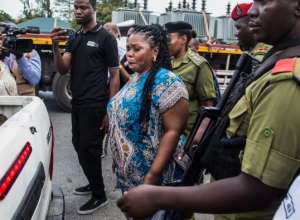Police in Tanzania have arrested three leaders of the main opposition party in a series of detentions to prevent a planned anti-government protest, the latest in a string of events that analysts and rights groups say erode hopes of a new style of politics under President Samia Suluhu Hassan.
Freeman Mbowe, the chair of the Chadema party, was arrested on Monday in the commercial capital, Dar es Salaam, while speaking with journalists. The party’s deputy chair, Tundu Lissu, was taken from his home in the city in a fleet of 11 vehicles, the party said. Godbless Lema, a central committee member, was also arrested, police said.
“Demonstration is our constitutional right,” Mbowe said before police took him away.
The arrests came on the day Chadema had planned to protest against the alleged disappearances and killings of its members and other government critics by security forces. The protest was banned by the police earlier this month.
Jumanne Muliro, the commander of the Dar es Salaam special police zone, said 14 people, including Mbowe and Lissu, were arrested on Monday for disobeying the ban.
Mbowe’s daughter was also taken into custody moments after her father, and the Citizen newspaper reported that police arrested two journalists from its parent company, Mwananchi Communications, although one was later released.
Riot police were positioned in different areas of the city to prevent the protest.
Chadema has accused Hassan’s administration of targeting critics. Numerous party members have gone missing recently. Earlier this month, Ali Mohamed Kibao, a member of the party’s national secretariat who had been abducted by armed men, was found dead, severely beaten and his face doused with acid, Mbowe said.
Hassan became president after the sudden death in 2021 of John Magufuli, whose rule was characterised by censorship and repression and whose administration used oppressive laws to clamp down on criticism and opposition.
Her assumption of the presidency raised expectations that she would usher in a new era for Tanzania. She reversed some of Magufuli’s policies, including lifting a ban on opposition rallies and that of four newspapers. But hopes have dimmed amid a wave of arrests, including of people planning protests against a port management deal last year, and last month’s detention of Mbowe, Lissu and about 400 Chadema supporters.
Analysts and rights groups say she is using the same authoritarian tactics as Magufuli, and that the situation is getting worse ahead of elections expected next year.
Oryem Nyeko, a Tanzania researcher at Human Rights Watch, said that while there were “positive signs” at the start of Hassan’s presidency, “it’s starting to look like more of the same”.
“The arrests of Mbowe and Lissu send a troubling message about how tolerant the president is of the opposition,” he said. “They’re raising legitimate concerns about important issues and she should be listening to them, and addressing them, instead of clamping down on them.”
Tito Magoti, a Tanzanian human rights lawyer, said Hassan had “taken a more radical stance” towards the opposition and civil liberties because she was feeling the pressure of more people wanting to participate in government and growing calls for respect for human rights.
the Guardian

